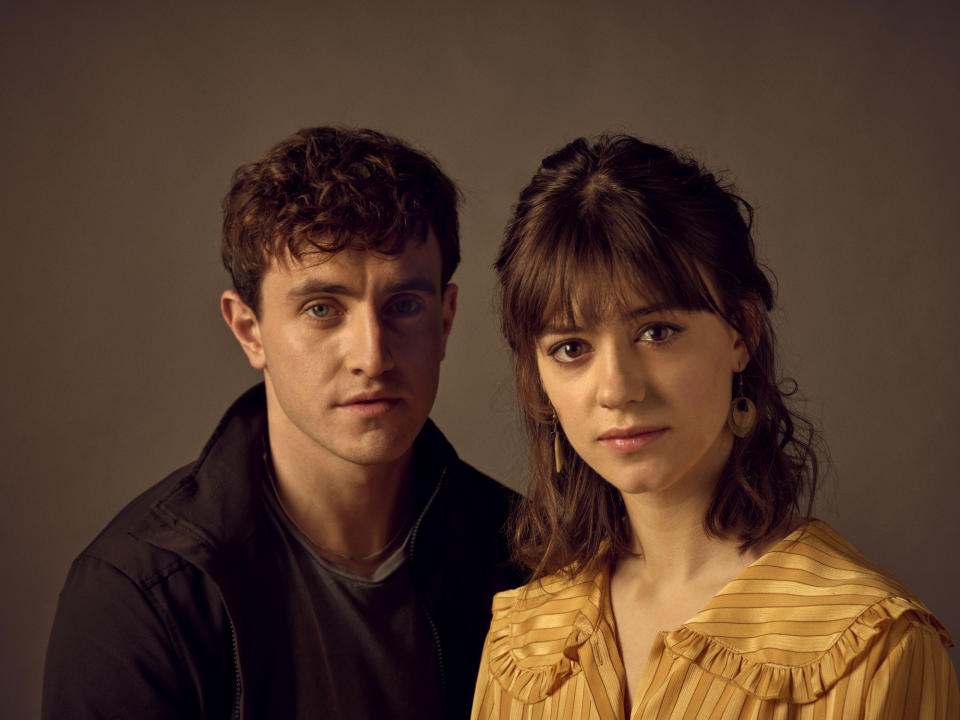Why are we so obsessed with Normal People and watching other people's relationships?

From spawning a spoof Instagram account of lead character Connell’s chain, to DIY tutorial’s about how to cut your own Marianne-esque fringe, there’s little doubt that the obsession surrounding Normal People will be one of things to define lockdown 2020.
Earlier this week BBC Three revealed the adaptation of Sally Rooney’s award-winning novel had delivered the channel its best ever week for programme requests, more than doubling the previous record held by Killing Eve.
The hit show was requested more than 21.8 million times on BBC iPlayer in the week since it first dropped on 26 April.
ICYNW (In Case You’re Not Watching - who even are you?) Normal People follows Marianne (Daisy Edgar-Jones) and Connell (Paul Mescal), in a coming-of-age love story of two Irish teenagers navigating an on-off relationship while struggling with the class and social barriers that regularly throw a spanner in the works.
And it has given us all lockdown life (and not just because Connell is EVERYTHING!)
As the name suggests, however, there is actually nothing extraordinary about the story, or the characters in it. In fact, it’s pretty ordinary.
Read more: Normal People’s Paul Mescal talks about being naked on screen
Of course, there is something utterly compelling about watching the everyday ordinariness of people’s lives, particularly people’s relationships.
When we’re used to the whistles and bells love stories we see in Hollywood productions, it is somewhat refreshing to delve into a stripped back, simple story that feels somewhat more true to life, in all its raw, painful awkwardness.
And by God some of the scenes are so intimately awkward it almost feels like you’re intruding just by watching.
The lure of the on-off relationship
According to chartered psychologist Dr Audrey Tang, author of The Leader’s Guide to Resilience due out in late 2020, it’s the underlying ‘we can’t deny our love’ sense of chemistry between Marianne and Connell that has so captured viewers.
She has a point. Fundamentally what makes the series so utterly absorbing is the will-they-won’t-they relationship between the series lead characters, which often leaves us flitting restlessly between tears of joy and frustration.
“Any form of cliff hanger is a draw – it is the soap opera playbook,” explains Dr Tang. “But the stories where we are more likely to root for the characters is when, as is definitely the case in Normal People, the characters, when together, being out the best in each other.
“Because you can see how holistic they make each other, you are more likely to root for the relationship – not for the relationship but for the outcome.”

The Love Island Effect
Dr Tang believes the awkwardness of first love depicted by Connell and Marianne has the same raw feel as captured by earlier UK comedies such as Inbetweeners, Coupling and the ‘dramady’ Cold Feet, and of course reality TV shows about finding love such as Love Island and Love is Blind.
She believes it is this ‘truth’ of emotions that has probably resonated with many.
So what is it about other people's relationships that people seem to find so fascinating?
Dr Tang believes the success of this show, and others like it, is partly about relating things back to your own experiences of love and loss.
“If you connect with the fundamental traits of a character, you may well be able to better understand the consequences of your actions, or why others may relate to you in such a way,” she explains.
“Watching relationships also enables us to talk more freely about the points they raise…Connell and Marianne’s behaviour becomes like the proverbial ‘…asking for a friend’,” she adds.
Read more: Study finds consensual non-monogamy in relationships is a ‘healthy’ option
And of course getting absorbed in relationships that work out gives us hope.
“If we like characters, we tend to invest our time and emotion into them and when they are happy we are happy,” she says. “We tend to feel empathy for characters we relate to rather than sympathy which means we connect with their happiness, if they are sad, we are also sad, and we want them to be happy.”
Dr Tang notes that this would be similar if the plotline was about someone working to make it in a career field, or achieving a groundbreaking invention.
“I felt just as much connection with The Boy Who Harnessed the Wind, I wanted that water to flow, just as much as people wanted Marianne and Connell to stay on track.”
So are we simply sympathising as we might have been through similar?
“This is certainly possible,” explains Dr Tang. “Love Island often led to us unconsciously projecting our own relationships onto the contestants leading some to be adored, others vilified.”
Dr Tang says this is all to do with the effect of something known as unconscious projection.
“As humans we connect with what we see, and our brains have trouble separating fantasy from reality when it comes to experiencing emotions,” she says.
“We can get as invested in soap characters as our own relationships because empathy often means we simply experience the emotional reaction to their story without fully appreciating that it is not related to us personally.”
But getting so invested in the relationships we see on screen can actually cause problems IRL, particularly if we have been through what we are seeing (or think we are seeing), especially if it was a negative experience for us.
“If we have not worked through our specific experience, understood our role in what happened (even if we were not to blame), any residual anger or negative emotional memory can be unconsciously or otherwise directed onto the person we see as behaving in the manner that hurt us. This is damaging to both ourselves and the object of our projections,” Dr Tang explains.
Read more: Normal People: All The Behind The Scenes Photos You Need To See
Love in a pandemic
Taking nothing away from the simple brilliance of the series, timing wise the show’s release (at the beginning of lockdown) could not have come at a better time as the nation searches for something to ease the gloom of social distancing.
“As with any binge worthy series, Normal People offers a form of escapism from a currently trying time – this has precedent in the wartime to post-war era of Hollywood where escapism was essential to wellbeing,” Dr Tang explains.
“Perhaps there is also something to be said about lockdown potentially feeling like a barrier to some relationships right now, in that we cannot see each other if not distancing together,” Dr Tang continues.
“And perhaps shows about love winning through give us all hope that we can get through this too.”

‘Water cooler’ moments
Of course, the more we hear about other people’s obsession with the show, via articles like this, the more obsessed we become.
“As well as emotional investment, [Normal People] provides a sense of community and inclusion – which is a fundamental human need – according to a psychologist called Schultz, this need is as important for survival as food and water!
“If our friends and colleagues are watching it, we feel we also ought to watch it.”
It is this mixture of identification and empathy which brings emotional connection and investment with the story that keeps us watching.
“[We feel] a desire to be included in discussion; the opportunity to analyse and discuss relationships using the characters as a starting point for areas we might have struggled to talk about; a sense of ‘oh it’s not just me’ (especially in the awkward moments); escapism; and simply because we just like the show.”
Dr Tang believes the final word on love should perhaps go to Plato, because as well as Platonic love he defines the more common ‘surface’ romantic love.
“He says in his Symposium, of romantic/sexual love – every human ‘wanders the earth in pain looking for it’ – romantic love is something we believe we all need,” Dr Tang sites.
“A show which captures a relationship well is likely to win our affections, at least on the (sur)face of it.”



